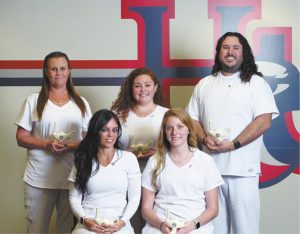By Dr. Nashat Abualhaija, Ph.D., MSN, RN


If you answer yes, then nursing is a great career choice.
According the Bureau of Labor Statistics (BLS), the average salary in Florida for a nurse is $72,000, and Florida is in the top five for employing nurses.
Hodges University’s Thelma T. Hodges Bachelor of Science in Nursing (BSN) program is accelerated. You are immersed in gaining the knowledge and skills needed to earn your bachelor’s degree and be prepared to take the NCLEX exam for your Registered Nurse license. And this is done in four semesters.
You’ll learn from faculty, nurses themselves, who bring the added real life expertise that goes beyond classroom materials. With that knowledge, you’ll apply it in our advanced nursing simulation suite, starting with the basics of patient care to advanced scenarios. You’ll practice on SIM patients that include newborns, mothers giving birth, children, and adults.
“Tory” is a life-like high-fidelity newborn that weighs just over eight pounds. She can breathe, cry, grunt, open and close her mouth, blink her eyes and move her arms and legs. “Tory’s” skin feels like a real newborn and her skin tone can change to become pale, jaundice or cyanotic. Our students can listen to her heartbeat, lung and abdominal sounds, feel her pulse and fontanels, and assess her muscle tone. She can also suffer seizures if that is part of the simulation scenario. Students can also practice starting IVs on the newborn, perform CPR, and ECG monitoring.“
“Hal” is a pediatric patient that can simulate lifelike emotions and phrases. Pediatric “Hal’s” emotions, include anger, worry, anxiousness, crying, yawning, and being quizzical and amazed. This helps our students learn how to communicate with young patients in a variety of settings. For example, if “Hal” is lethargic, his eyelids will droop and his head movements slow, and he may yawn. When he cries, he sheds real tears to further enhance the student learning process related to pediatric patients and communication. Our students practice multiple skills to assess “Hal’s” condition, including trauma, neurological diseases, and respiratory distress. His eyes will track when students enter the room and his pupils can dilate and constrict when a penlight is shined on them. Our students can also listen to his heart, lung and bowel sounds, and detect any abnormal respiratory patterns. Students can also practice using airway support devices and hem thorax procedures.
Several adult “Susie” mid-fidelity simulators provide our students the opportunity to learn and practice their clinical skills. Some of the skills taught in the Hodges University nursing skills lab include obtaining vital signs and listening to heart, lung and bowel sounds. Students can also practice tracheostomy care, nasogastric tube insertion, feeding and care, patient catheterization, correct placement of ECG electrodes, and CPR. “Susie” can also suffer from medical conditions that include a heart attack, heart failure, acute respiratory distress, asthma, chronic obstructive pulmonary disorder, fluid and electrolyte imbalance, hypoglycemia, new onset diabetes, pneumonia and sepsis.
Adult “Hal” gives our students the opportunity to practice connecting monitoring devices for EKGs, defibrillators, oximeters, capnographs and NIBP monitors. Hodges University students can practice various skills, including nasal/oral intubation, surgical airway, feeling carotid, femoral, popliteal, brachial and pedal pulses, listening to airway, bowel and heart sounds, and visualizing tongue edema, pharyngeal swelling, and more. Students can also practice IV insertion and monitoring, intramuscular access, catheterization, and needle decompression.
With classroom and simulation experience, our students graduate prepared, and confident, to be the nurses our community needs.
Dr. Nashat Abualhaija, Ph.D., MSN, RN, is the Director of the Nursing program at Hodges University. His research foci include transcultural nursing (especially examining cultural competence among healthcare professionals, leaders, and systems; evaluating cultural competence among nursing students and faculty), men’s health disparities, and student-centeredness and active learning approaches in nursing academia.
Hodges Univeristy
239-938-7744 | Hodges.edu
 Southwest Florida's Health and Wellness Magazine Health and Wellness Articles
Southwest Florida's Health and Wellness Magazine Health and Wellness Articles

